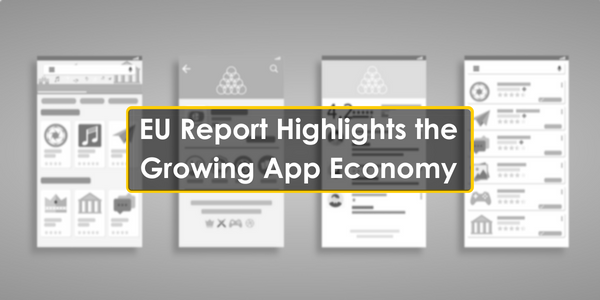2018 marks the ten year anniversary of the app ecosystem. In 2008 both Apple’s App Store and Google Play were launched, radically changing the way consumers interface with their devices.
Since then, the app economy has grown significantly and at a very fast pace, as shown by the latest report on the state of play in the EU app economy, published by the European Parliamentary Research Service (EPRS) earlier this month.
In spite of its fast growth, the app economy seems to be far from reaching saturation. In 2021 the number of global app users is expected to double and reach 6.3 billion people.
The mobile app economy generated around 75 billion € in revenues between the five largest European countries in 2013 and has grown at a steady rate of 25% since. The EU app economy accounts for approximately one third of the global market. Interestingly, the report shows that in 2017 Europe overshadowed the United States for the first time ever in the number of jobs created.
The app economy is sustained by a mobile sector performing very strongly with its consumers. In 2016, more than 80% of persons aged 16 to 74 used the internet, and 79 % of them did so via a smart or mobile phone. In 2015, around 90% of European households owned a smartphone, while 60 % owned a tablet. And those numbers will expand, as the number of European smartphone subscriptions is expected to grow steadily from 2017 to 2023, while mobile data traffic will increase more than six-fold in the same period.
According to the study, as of March 2017 there were 5 million apps available on Google Play and Apple App Store and those numbers are growing by several thousand each month. 2 billion users access the app stores globally and the two platforms have recorded over 122 billion downloads in 2016.
The picture that the EPRS study paints is definitely positive. The European app economy is recognized as a competitive, fast-growing, and innovative sector contributing substantially to national GDPs and creating millions of jobs.
The report identifies several factors behind the sector’s growth, from growing coverage to improved mobile device functionality, and also the important role played by platforms, such as Apple and Google, in lifting the high barriers to market entry for independent software developers.
The study also highlights the technical, business, and regulatory bottlenecks slowing down the growth of the sector, with the biggest issues being around access to financing, limited investment, shortage of digital skills, platform incompatibility, and inconsistent laws across EU countries.
In various other studies that the Developers Alliance carried out (see bottom of the page), we recorded similar concerns and we are pleased to see that the European Institutions are committed to solving those through the several initiatives flagged in the report.
The regulatory landscape has a great influence on the potential growth of the app economy. Policy can and should create the right conditions to ensure developers can easily start new businesses and should make sure that all access barriers to an efficient and non-fragmented global market are removed. At the same time, it is important that regulators do not overly-regulate the market, especially not through restrictive government initiatives that could cause fragmentation and lack of compatibility across devices.
The ecosystem has developed, over the past few years, into a strong and stable one also thanks to anti-fragmentation efforts that have made developers’ lives much easier than they were 10 years ago. Back then, in order to access a significant portion of the market, developers had to code for hundreds of different platforms and devices, with a subsequently inefficient allocation of capital and resources. The current situation allows developers to access large markets by coding for a relatively small number of platforms. This means that they have more capital available to invest into innovating and perfecting their products.
We are currently awaiting some important decisions on these topics at the European level, on various Digital Single Market files and on the Android case. We hope that policy-makers will understand that trying to limit the market power of certain players risks creating fragmentation and uncertainty that will endanger smaller companies and startups.
- Report on Competition in the Mobile App Ecosystem, Autumn 2016
- The Mobile App Ecosystem Remains Stable and Competitive, June 2017
- Jobs in Apps – Mobile Economy in the Nordics – A Catalyst for Economic Growth, Copenhagen Economics, June 2017
- Mobile Developers & Publishers Have Overwhelmingly Positive View of Platforms, November 2017
MICHELA PALLADINO
Director, European Policy & Government Relations





